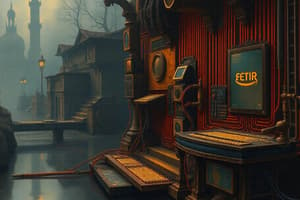Podcast
Questions and Answers
What does hardware refer to in a computer system?
What does hardware refer to in a computer system?
- Programs like games and web browsers
- Physical elements like wires, sensors, and hard drives (correct)
- The central processing unit (CPU)
- Instructions that tell the computer what to do
Which component is responsible for storing data while it's being processed by the CPU?
Which component is responsible for storing data while it's being processed by the CPU?
- Memory (RAM) (correct)
- Power supply
- Graphics card
- Input/output ports
What determines how fast a computer can run?
What determines how fast a computer can run?
- Network ports
- Motherboard
- Central processing unit (CPU) (correct)
- Storage devices
Which of the following is an example of software?
Which of the following is an example of software?
Without which hardware component would the image not show up on the screen?
Without which hardware component would the image not show up on the screen?
Which hardware component would you prioritize if you wanted your computer to perform tasks quickly?
Which hardware component would you prioritize if you wanted your computer to perform tasks quickly?
Flashcards are hidden until you start studying
Study Notes
Computer Components Overview
A computer is made up of several components that work together to perform tasks and display information. These parts can generally be divided into two categories: hardware and software. Each part plays a vital role in ensuring the smooth running of the device. Let's take a look at what these terms mean and how they function within a machine.
Hardware
Hardware refers to all of the physical elements inside your computer — the tangible things you can touch like wires, sensors, video cards, and hard drives. It includes a motherboard, central processing unit (CPU), power supply, memory, storage devices, and input/output ports such as USB ports, audio jacks, and network ports. All of these pieces need to fit perfectly together to make sure everything works right. For example, without RAM, there would be nowhere to store data while it’s being processed by the CPU and without a graphics card, the image wouldn't show up on the screen. Hardware also determines how fast a computer can run; faster processors make more calculations per second, so if you want something done quickly, get a speedy processor.
Software
In contrast, software consists of instructions that tell the computer what do with its hardware components. In simple terms, this means programs, which can range from games to web browsers to text editors. If you wanted to type out some letters using a word processor, for instance, you might install Microsoft Word onto your laptop or desktop. Once installed, Word becomes part of your operating system, meaning it uses the existing resources of your computer, such as the keyboard and mouse, to allow you to create documents. Because software doesn't have any physical form, multiple copies of the same program can exist simultaneously on different computers. However, each copy needs access to the right hardware via the OS, otherwise nothing happens.
So, when someone talks about their 'new computer' they usually mean either new hardware or a combination of both—a completely rebuilt machine containing brand-new circuit boards, chips, and other gadgetry designed specifically for working with today's latest technology. This ensures compatibility and high performance, allowing users to enjoy seamless computing experiences.
Studying That Suits You
Use AI to generate personalized quizzes and flashcards to suit your learning preferences.




